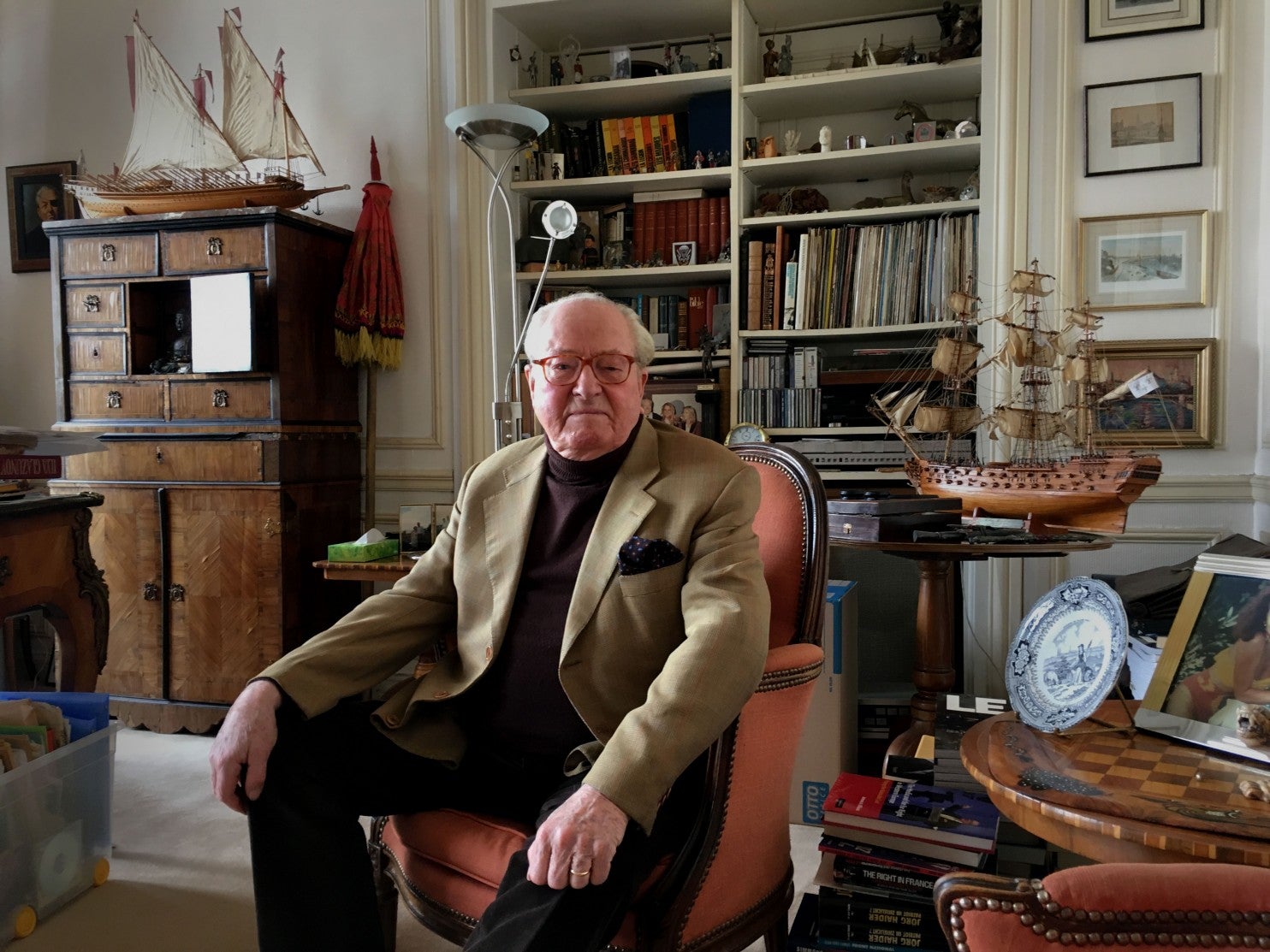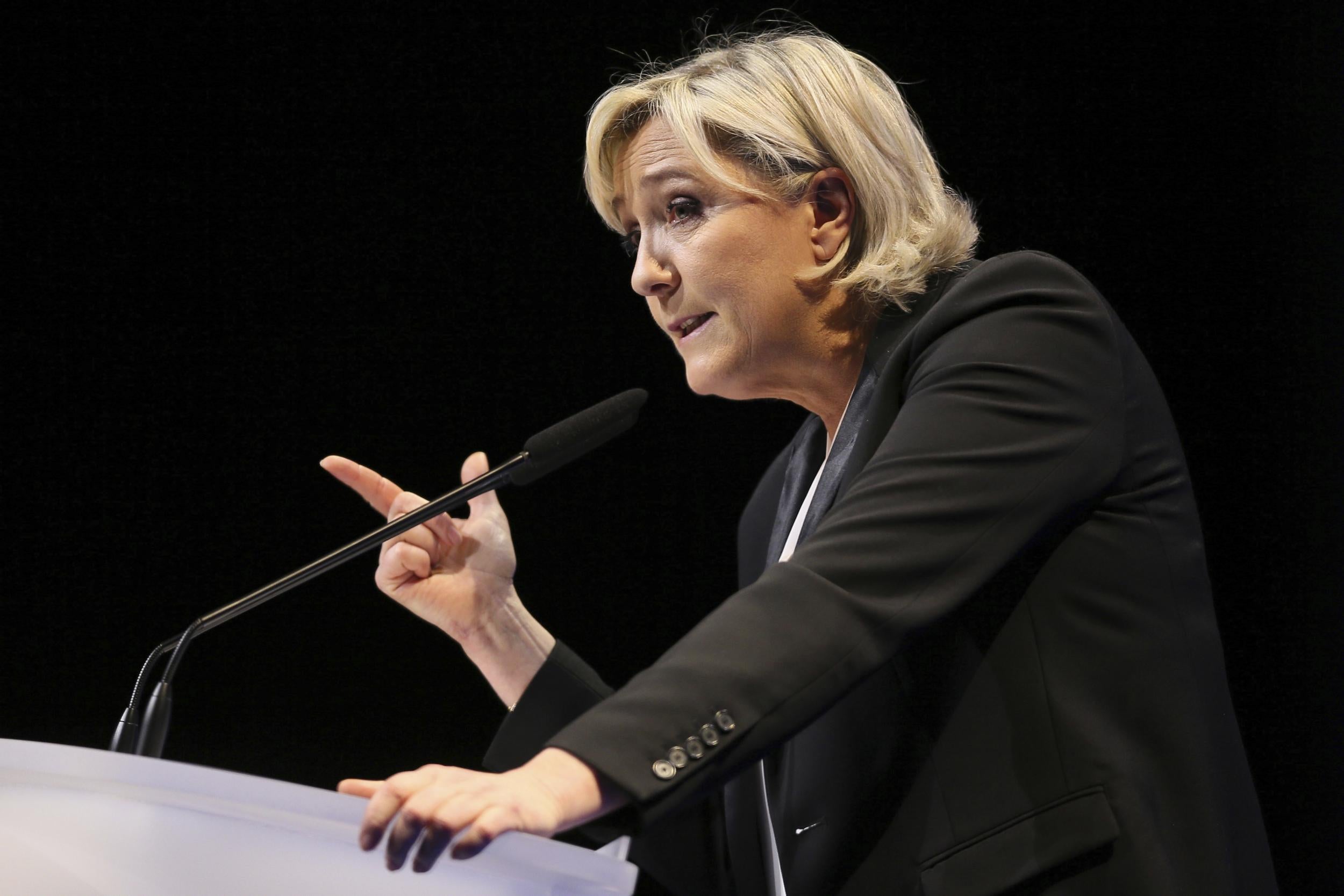French rightist Jean-Marie Le Pen declares victory
France’s National Front co-founder Jean-Marie Le Pen says the battle is already won as far as the country’s upcoming presidential election is concerned

Your support helps us to tell the story
From reproductive rights to climate change to Big Tech, The Independent is on the ground when the story is developing. Whether it's investigating the financials of Elon Musk's pro-Trump PAC or producing our latest documentary, 'The A Word', which shines a light on the American women fighting for reproductive rights, we know how important it is to parse out the facts from the messaging.
At such a critical moment in US history, we need reporters on the ground. Your donation allows us to keep sending journalists to speak to both sides of the story.
The Independent is trusted by Americans across the entire political spectrum. And unlike many other quality news outlets, we choose not to lock Americans out of our reporting and analysis with paywalls. We believe quality journalism should be available to everyone, paid for by those who can afford it.
Your support makes all the difference.He is a convicted Holocaust denier but also the patriarch of the party that could soon triumph in France's presidential election. These days, Jean-Marie Le Pen, now 88, struggles to walk. But his ideology is on the move: in a once unimaginable scenario, the National Front – the party he co-founded in 1972 and passed on to his daughter, Marine, in 2011 – could win nearly 40 per cent of the vote in the French election this spring, possibly even more. Regardless of the outcome, he says, the battle is already won.
As populist fervour soars in Europe and the United States, politicians and analysts have struggled to explain what has been labelled a dramatic new challenge to the established order. But the National Front is anything but new, and the populist proposals that draw headlines today – returning to the nation-state, expelling immigrants and limiting globalisation – are things Le Pen has preached for decades. Now, people are listening.
“After all, they can say, ‘Le Pen was right,’” he said recently, reclining on a divan in Montretout, the 11-room mansion he owns in this leafy Paris suburb. “Public opinion – the voters, the citizens – has realised that the ideas we defend are not 'extremist,' as our adversaries say, but that they conform to the truth.”
But conforming to the truth has never quite been the mission of Jean-Marie Le Pen, and this, analysts say, is precisely the power of the revolution he started in the 1970s. He may be a godfather of Europe's radical and populist right, but for many, his principal contribution to political life has been the establishment of an alternate reality where facts are always fluid.
“He is a precursor of post-truth, of ‘alternative facts,’ of fake news,” said Michel Wieviorka, an expert on the history of Le Pen's party and the author of “The National Front: Between Extremism, Populism and Democracy.”
“That is his project.”
For decades, Le Pen was dogged by allegations that he had tortured Arabs as a young lieutenant in France's 1954-1962 war against its breakaway colony Algeria. He still vigorously denies the accusations, despite testimony by several people who said they were his victims.

Most notoriously, he has also been accused of what experts call “soft-core denial” of the Holocaust, the darkest chapter in the history of modern Europe. French authorities willingly collaborated in the Nazi genocide and assisted in deporting some 76,000 Jews to their deaths in concentration camps.
In 1987, Le Pen, speaking in an interview, referred to the gas chambers as a “detail in the history of World War II.” In 1996, he told a news conference in Germany: “If you take a 1,000-page book on World War II, the concentration camps take up only two pages and the gas chambers 10 to 15 lines. This is what one calls a detail.”
Since then, he has been convicted of Holocaust denial in French courts and fined tens of thousands of euros – penalties that have failed to discourage him from repeating the idea that the systematic extermination of 6 million Jews and others was somehow a trivial affair.
Such an insistence reflects more than simple ignorance of history, experts say.
“He knows the full significance of what happened,” said Deborah Lipstadt, a historian at Emory University and an expect on Holocaust denial. “It’s a way of saying, ‘Those Jews are always complaining.’ It’s a way of spreading hostility, animosity and prejudice. That’s why I call it anti-Semitism.”
Unlike most of Europe’s current far-right leaders, Le Pen experienced World War II as a teenager. For decades after the war, French leaders played down or denied the extent of their country’s complicity with the Nazis. Eventually they apologised – but Le Pen never did. Before founding the National Front, he ran a record label that produced albums heralding Nazi war marches and celebrating the poetry of French intellectuals who had collaborated with the Germans.
These days, Le Pen makes no secret of his admiration of President Trump, although he says he has no contact with his administration.
“If I were Marine Le Pen,” he said, “I would run exactly the same campaign as Trump, showing the rejection of the establishment, which I believe is majoritarian in France.”
In the interview in his study at Montretout – which in French means “showing all” – Le Pen said he has never regretted calling the gas chambers a “detail”. He then proceeded to mock the outrage he has elicited over the years.
“I regret the persecution of which I was the object, unjustly,” he said.
“When someone criticises, I say, how would you say it otherwise? What can we say? Is there a truth?”
This line of defense, for Lipstadt, symbolizes the threat posed by deniers.
“This is what Holocaust deniers are trying to do: They take a lie and dress it up as an opinion to be debated,” she said. “But there are objective facts. Not everything is open to debate.”
When National Front voters go to the polls, they will vote for Marine Le Pen, not for Jean-Marie Le Pen. And the younger Le Pen, 48, has run a campaign that has largely sought to erase her father from the party's public image.
According to the narrative circulated by Marine Le Pen and her aides, she severed ties with her father after April 2015, when he gave an interview in Rivarol, an extreme right-wing journal, once again calling the gas chambers “a minor detail in the history of World War II” and defending Philippe Pétain, the leader of France’s Vichy government, which collaborated with the Nazis between 1940 and 1942. Jean-Marie Le Pen suddenly found himself expelled from his own party.
Marine Le Pen could not be reached for comment.
But a National Front official, speaking on the condition of anonymity, insisted that Marine Le Pen’s party is not at all the party her father created and nurtured on the political fringe for decades. “The National Front of Marine Le Pen is not a movement that rejects the Shoah or recycles Mr. Le Pen's ambiguity on the question,” the official said, using an alternate term for the Holocaust.
In recent days, however, Benoît Loeuillet, a regional National Front official in the South of France, was exposed on camera, in a documentary on the party, denying the Holocaust in starker terms than those used publicly by Jean-Marie Le Pen.
“I don't think there were that many deaths. There weren't 6 million,” he was quoted as saying. “There weren't mass murders as it's been said.”
Loeuillet was summarily dismissed from the party, but critics pointed out that he was fired only when his words were made public.
Jewish groups have also accused Marine Le Pen's campaign of a subtle anti-Semitism, pointing to statements such as her insistence that French Jews should not be allowed to simultaneously hold Israeli citizenship and her condemnation of her principal political opponent, former investment banker Emmanuel Macron, as an emissary of the “Rothschild bank” and “international finance” – echoing anti-Semitic propaganda that has tied major financial groups to Jews.
For his part, Jean-Marie Le Pen does not see such a fundamental difference between his daughter’s vision and his own.
“I think she’s loyal first of all to herself,” he said with a chuckle. “But objectively, I believe she's more or less faithful to the line I defended and that I followed in all cases.”
In recent years, Marine Le Pen has stopped at nothing to repudiate her father and his world.
“Montretout, it’s not my story,” she told reporters in January 2015 of the family estate in St. Cloud, where she spent nearly 30 years, from childhood through adulthood.
But the ageing warden of Montretout – a mansion in a gated community outside Paris, decorated with statues of Joan of Arc and a fireplace panel depicting the head of Jesus – is still paying many of her campaign expenses.
Despite the current candidate’s talk of an “estrangement” from her father, the political lending firm he controls, Cotelec, akin to a super PAC, lent her 6 million euros this year when a Russian bank withdrew on its pledge.
Speaking about his daughter's attempts to “de-demonise” their party – and thus hide his imprint – the patriarch laughed.
“The biggest objection to this strategy was that she implicitly admitted that I was the devil,” he said. “When, in fact, I resemble an angel.”
©Washington Post
Join our commenting forum
Join thought-provoking conversations, follow other Independent readers and see their replies
Comments